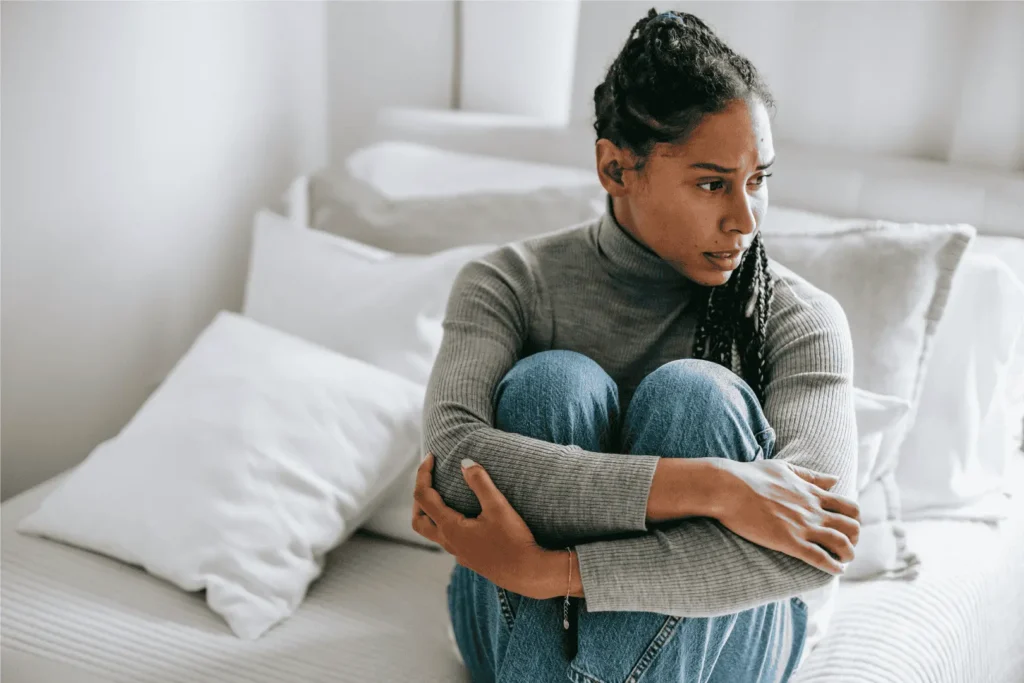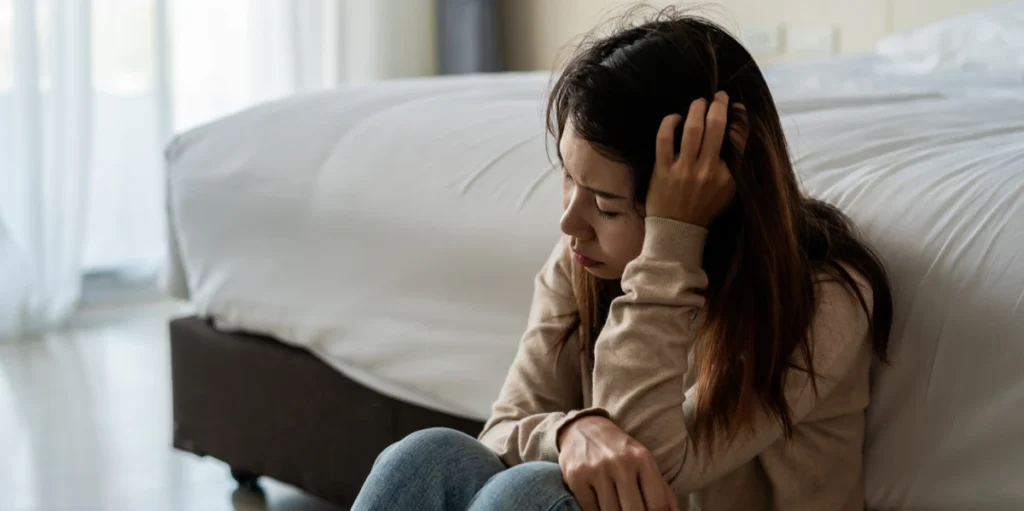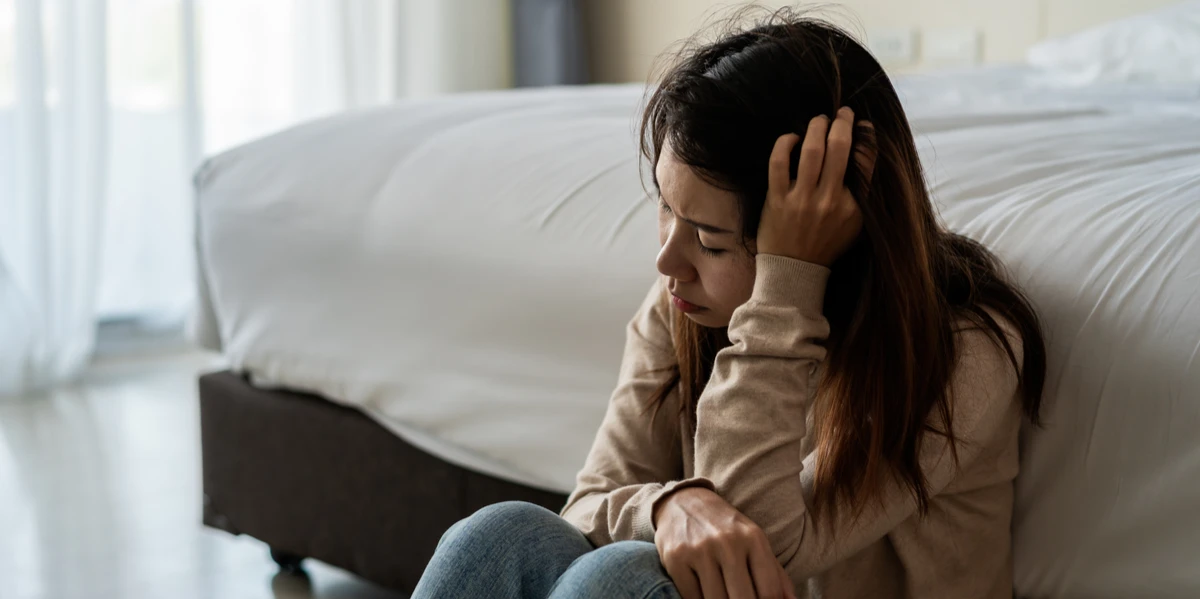Sudden depression can feel alarming when it seems to appear without warning. At SensIQ, Dr. Luke Barr and his team emphasize that while sudden mood changes are real, they often have identifiable causes and effective treatments. This article reviews what sudden depression is, its symptoms, and steps you can take with the guidance of a mental health professional.
Key Takeaways
- Sudden depression can appear quickly and feel overwhelming, but it often has identifiable causes such as hormonal shifts, stressful events, or underlying medical conditions.
- Symptoms may include emotional changes, physical complaints, or nighttime mood drops, and these can sometimes mimic other health problems like thyroid disease or anxiety disorders.
- Early recognition and treatment improve outcomes, and options range from talk therapy and medication to lifestyle adjustments and perimenopause-specific approaches.
- Preventive strategies like regular sleep, exercise, and balanced nutrition lower recurrence risk, while timely medical care supports long-term stability.
- Seek urgent help if sudden severe depression includes suicidal thoughts, and always consult a mental health professional for diagnosis and personalized care.
Can Depression Start Suddenly?
Is it normal to have sudden depression?
It is not uncommon for depressive symptoms to appear quickly, especially after stressful events or changes in health. While it may feel abnormal, many people report a sudden depressed mood that disrupts daily life.
Can a depressive episode come on suddenly?
Yes, a depressive episode can start suddenly, though most cases develop gradually. Clinical studies suggest that abrupt onset may be linked to major depressive disorder, bipolar disorder, or specific medical conditions¹.
Sudden depression for no reason
Sometimes, people feel sudden severe depression without a clear trigger. Often, underlying health problems such as thyroid disorders, hormonal changes, or side effects of medication contribute.
What a sudden depression episode looks like
A sudden depression episode may include loss of motivation, changes in sleep, and difficulty concentrating. These episodes may resolve quickly or persist, signaling the need for professional evaluation.
Symptoms of Sudden Depression
Emotional and physical signs
Common symptoms of depression include low mood, guilt, fatigue, and poor sleep. Physical complaints such as headaches or stomach issues are also common2.
Sudden depression attacks and acute episodes
Some describe sudden episodes as “attacks” of sadness, hopelessness, or anxiety. These can be brief but intense, and if they repeat, they may indicate a mental health condition.
Sudden depression at night
Nighttime is a frequent time for depressive symptoms to worsen. Disrupted sleep cycles and racing thoughts increase vulnerability, making it harder to cope.
Causes of Sudden Depression

Why does sudden depression develop
Causes include a mix of biological, psychological, and social factors. Stressful events, medical conditions, and a family history of depression all increase the risk of sudden onset.
Hormonal changes: perimenopause, menopause, and depression at 40
Hormonal shifts in the 30s and 40s can trigger a depressed mood. Women in perimenopause often report sudden mood swings, with research suggesting these changes are linked to estrogen fluctuations3.
Sleep loss, grief, and trauma
Lack of sleep, unresolved grief, or trauma can trigger sudden depression. These stressful events may trigger episodes even in individuals with no prior history.
Medical conditions, medications, and risk factors
Certain medical conditions, including heart disease and chronic pain, are associated with a higher depression risk. Some medications also cause mood changes, making it essential to talk to your doctor if symptoms begin abruptly.
Conditions that mimic sudden depression
Thyroid disease, vitamin deficiencies, and anxiety disorders can look like depression. Distinguishing between these requires evaluation by a mental health professional.
Sudden Depression and Anxiety
How they overlap
Depression, including anxiety disorders, often coexist. People may experience both low mood and intense worry, which can exacerbate sleep disturbances and impaired concentration.
When anxiety worsens, symptoms
Anxiety increases the risk of longer depressive episodes. The overlap also complicates diagnosis, making professional guidance essential.
What to Do When You Suddenly Feel Depressed
Quick coping steps
If you suddenly feel depressed, try grounding techniques, breathing exercises, or brief walks. Maintaining a simple self-care routine can help reduce stress and anxiety.
When to seek professional help
If depressed mood lasts more than two weeks or disrupts work and relationships, contact a mental health professional. Early evaluation helps identify whether you have major depression or another medical condition.
Treatment and Recovery Options

Perimenopause depression treatment
Non-hormonal treatments, lifestyle changes, and nutritional support may help manage mood shifts linked to perimenopause. SensIQ offers neurologist-designed protocols that focus on clarity and calm.
Does perimenopause depression go away?
For some, mood changes improve as hormones stabilize. For others, long-term support is needed, often through a combination of lifestyle adjustments and medical care. In some cases, symptoms may extend into late menopause, requiring continued attention and tailored treatment.
Menopausal depression test and screening
Doctors may use questionnaires and lab work to check for menopausal depression symptoms. Testing helps separate depression from other health problems.
How to overcome menopause depression
Combining exercise, a healthy diet, and stress management with professional care provides the best outcomes. Talk therapy and medication may be recommended as a treatment option.
Psychotherapy and counseling
Talk therapy helps people process depressive symptoms and stressful events. Approaches like cognitive behavioral therapy are effective in major depressive disorder, and resources on menopause and mental health highlight how hormonal transitions can uniquely influence mood.
Antidepressants and safety
Antidepressants may be prescribed for major depression. They require medical supervision, as some drugs interact with other health problems or increase side effects.
Lifestyle habits for long-term support
Regular exercise, balanced nutrition, and sleep hygiene support recovery. These habits also help treat depression by lowering risk factors and improving resilience.
Red Flags and When to Get Help
Emergency signs (call 988)
If you have thoughts of self-harm, call 988 in the United States or local emergency services. Sudden severe depression combined with suicidal thinking is a medical emergency.
What to tell your clinician
Bring notes about your symptoms, recent health changes, and family history of depression. This helps your clinician distinguish between major depressive disorder and other medical conditions.
Self-Check and Next Steps
Two-minute checklist
Ask yourself: Have I lost interest in daily life? Do I feel hopeless or fatigued most days? Have my sleep or appetite changed? If yes, it may be time to seek help.
References
- Cleveland Clinic. (2023, December 8). Depression: What it is, symptoms, causes, treatment & types. Cleveland Clinic. https://my.clevelandclinic.org/health/diseases/9290-depression
- Mayo Clinic. (2022, December 14). Depression (major depressive disorder): Causes. Mayo Clinic. https://www.mayoclinic.org/diseases-conditions/depression/symptoms-causes/syc-20356007
- National Institute of Mental Health. (2023, January). Major depression. U.S. Department of Health & Human Services. https://www.nimh.nih.gov/health/statistics/major-depression

